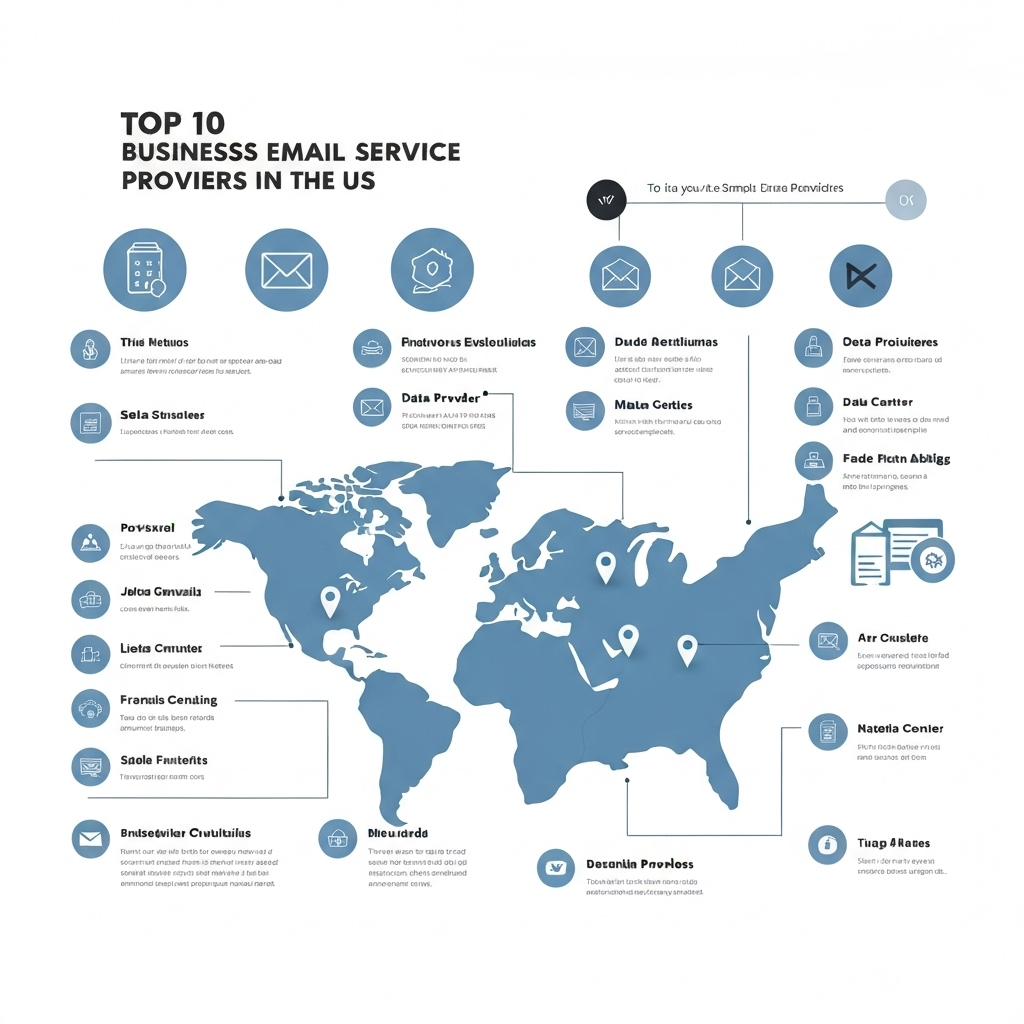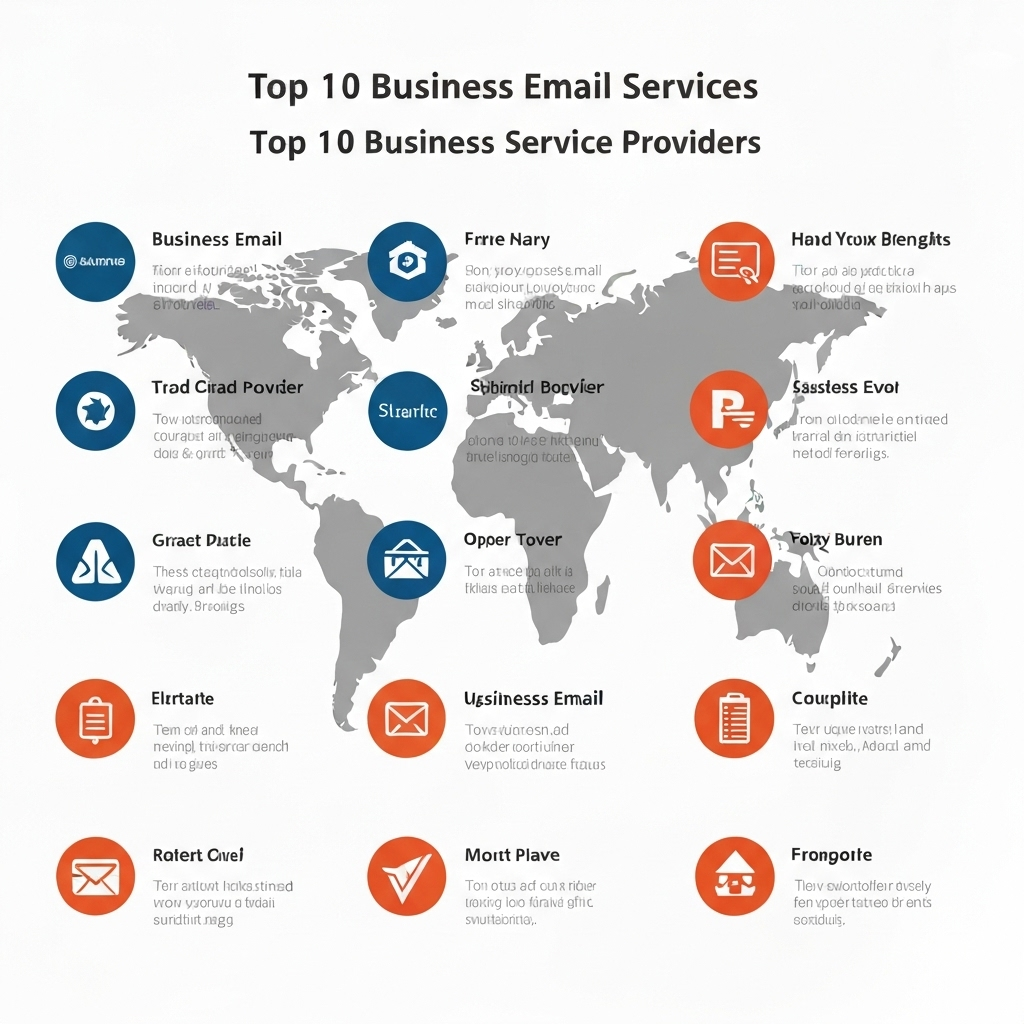Top 10 Business Email Service Providers in the US

In today's fast-paced business world, your email isn't just a communication channel; it's a digital storefront, a primary point of contact, and a crucial tool for productivity. For entrepreneurs, small business owners, and busy professionals across the US, choosing the right business email hosting is paramount. A professional email address, like [email protected], instantly boosts credibility and brand recognition, distinguishing you from free, generic email services. But with so many options available, navigating the landscape to find the top 10 business email service providers can feel overwhelming. This comprehensive guide will help you cut through the noise, highlighting the best solutions that enhance efficiency, ensure security, and streamline your daily workflow.
Key Factors to Consider When Choosing a Business Email Provider
Before diving into specific providers, it's essential to understand the core features that make a business email service truly valuable. Your ideal provider should align with your business goals, technical capabilities, and budget. Here are the critical factors to weigh:
- Professional Domain Name: A custom domain (e.g.,
[email protected]) is non-negotiable for professionalism. Ensure the provider helps you set this up easily. If you're just starting, learning to create an email account with your own domain is a vital first step. - Storage and Bandwidth: Consider how much storage you and your team will need for emails, attachments, and associated files. Generous storage ensures you don't miss important communications.
- Security Features: Look for robust spam filtering, virus protection, two-factor authentication (2FA), encryption (TLS/SSL), and data backup. For sensitive industries, end-to-end encryption might be a priority, making services like ProtonMail particularly attractive. Ensuring secure business email is crucial for protecting your company and client data.
- Reliability and Uptime: Downtime means lost productivity and missed opportunities. Providers typically guarantee high uptime (e.g., 99.9%), but it's worth checking their track record.
- Integration Capabilities: Does the service integrate with other tools you use, such as CRM systems, project management software, or cloud storage? Seamless integration is key to efficient workflows.
- Collaboration Tools: Many providers offer shared calendars, contact lists, team chat, and document collaboration features, which can significantly boost team productivity.
- Ease of Use and Management: An intuitive interface for both end-users and administrators is essential for quick adoption and efficient management, especially for small businesses with limited IT resources.
- Scalability: As your business grows, your email needs will evolve. Choose a provider that can easily scale up or down with your team size and storage requirements.
- Customer Support: Reliable and responsive customer support can be a lifesaver when issues arise. Look for providers offering 24/7 support, especially if you operate across different time zones.
- Pricing and Value: Compare pricing plans, features offered, and the overall value proposition. Free trials are excellent for testing services before committing.
Review of Top 10 Business Email Service Providers in the US
Selecting the right email provider is a strategic decision. We've compiled a list of the top 10 business email service providers in the US, renowned for their reliability, features, and suitability for various business needs. This email provider comparison aims to give you a clear overview.
Provider 1: Google Workspace (formerly G Suite)
Google Workspace remains a dominant force in the business email market, offering Gmail for business, coupled with a suite of powerful productivity and collaboration tools.
- Key Features: Professional Gmail interface, 30GB+ storage per user (expandable), robust spam filtering, Google Meet, Google Drive, Docs, Sheets, Slides, Calendar, and strong security controls.
- Pricing: Starts at $6/user/month for the Business Starter plan.
- Pros: Familiar interface, excellent integration across Google services, powerful search capabilities, generous storage, reliable uptime.
- Cons: Can become costly for very large teams, some advanced admin controls might be less intuitive than dedicated enterprise solutions.
- Best For: Businesses of all sizes, especially those already invested in the Google ecosystem or seeking a comprehensive productivity suite.
Provider 2: Microsoft 365 (formerly Office 365)
Microsoft 365, powered by Outlook, is the other major player, offering a compelling alternative with deep integration into the Windows environment and a vast array of business applications.
- Key Features: Professional Outlook experience, 50GB+ mailbox storage, OneDrive cloud storage, Teams for collaboration, Word, Excel, PowerPoint, SharePoint, robust security and compliance features.
- Pricing: Starts at $6/user/month for Microsoft 365 Business Basic.
- Pros: Seamless integration with Windows and Office apps, enterprise-grade security, comprehensive collaboration tools, scalable plans.
- Cons: Interface can feel complex for new users, Outlook's desktop client can be resource-intensive.
- Best For: Businesses heavily reliant on Microsoft Office applications, Windows environments, and those needing enterprise-level security and management.
Provider 3: Zoho Mail
Zoho Mail offers a robust and affordable solution, particularly attractive for small to medium-sized businesses (SMBs) looking for a comprehensive suite without the premium price tag.
- Key Features: Professional email with custom domains, 5GB storage per user (expandable), robust spam filtering, calendar, contacts, task management, and integration with Zoho's extensive business apps (CRM, Projects, etc.). Offers a free plan for up to 5 users with basic features.
- Pricing: Paid plans start at $1/user/month for Mail Lite, with more features in Mail Premium ($4/user/month).
- Pros: Excellent value for money, strong feature set for the price, integrates deeply with other Zoho products, generous free plan for small teams.
- Cons: Interface can be less polished than Google or Microsoft, some advanced features might require upgrading to higher tiers or other Zoho products.
- Best For: Small businesses, startups, and budget-conscious organizations looking for a comprehensive, integrated suite.
Provider 4: ProtonMail
For businesses prioritizing privacy and security above all else, ProtonMail stands out with its end-to-end encryption and commitment to user anonymity.
- Key Features: End-to-end encryption for all emails, zero-access encryption, Swiss privacy laws, custom domain support, secure file sharing, calendar, and VPN integration (with higher plans).
- Pricing: Business plans start around $8/user/month (billed annually).
- Pros: Unparalleled privacy and security, excellent for handling sensitive data, user-friendly interface despite advanced security.
- Cons: Encryption can limit some advanced search or integration capabilities found in less secure services, storage limits are generally lower than competitors.
- Best For: Businesses handling sensitive data (legal, medical, financial), privacy-conscious organizations, and those operating under strict data protection regulations.
Provider 5: Titan
Titan focuses on empowering small businesses with professional email, offering features designed for customer engagement and business growth.
- Key Features: Professional email with custom domains, 50GB storage, email templates, scheduling tools, read receipts, email tracking, CRM integration, and a built-in email builder.
- Pricing: Plans typically start around $1-$2/user/month when bundled with hosting or available standalone.
- Pros: Feature-rich for customer communication and sales, intuitive interface, good value for SMBs, strong focus on engagement tools.
- Cons: Less known than giants like Google or Microsoft, collaboration features might be less extensive for larger teams.
- Best For: Small businesses, freelancers, and sales teams looking to enhance customer communication and engagement directly from their email.
Provider 6: Neo.space
Neo positions itself as an all-in-one business platform, offering professional email alongside website building and other tools, making it an attractive option for startups and solopreneurs.
- Key Features: Professional email with custom domains, 100GB storage, AI website builder, team collaboration features, secure file storage, and a focus on ease of use.
- Pricing: Plans often start around $10/month for the basic package including email.
- Pros: Integrated suite of tools for building an online presence, generous storage, user-friendly, competitive pricing for the bundled services.
- Cons: Newer entrant, less established than mature players, advanced features might be less robust.
- Best For: Startups, solopreneurs, and small businesses needing an integrated platform to manage their online presence and communication.
Provider 7: Rackspace Email Hosting
Rackspace is known for its robust business-class hosting and dedicated support, offering reliable email solutions for businesses of all sizes.
- Key Features: Professional email with custom domains, unlimited storage (often cited), 24/7 expert support, robust security, webmail and desktop client support, archiving.
- Pricing: Typically starts around $2.99/user/month.
- Pros: Excellent, reliable support, generous storage, strong uptime guarantees, enterprise-grade infrastructure.
- Cons: Can be more expensive than some basic SMB solutions, integration with other productivity suites might require more effort.
- Best For: Businesses that prioritize premium support and reliability, and need scalable, robust infrastructure for their email.
Provider 8: Hostinger Email
Hostinger offers affordable web hosting solutions that often include professional email services, making it a cost-effective choice for many small businesses.
- Key Features: Professional email with custom domains, sufficient storage (e.g., 10GB-50GB depending on plan), webmail access, easy setup, integration with Hostinger's hosting ecosystem.
- Pricing: Often bundled with web hosting plans, or standalone email plans start very affordably, around $1-$2/month.
- Pros: Extremely budget-friendly, easy to set up if already using Hostinger for web hosting, decent features for the price.
- Cons: Storage and advanced features may be limited compared to dedicated email providers, support might be more generalized.
- Best For: Small businesses and startups on a tight budget that are also looking for web hosting services.
Provider 9: Front
Front is designed for teams, transforming the inbox into a collaborative workspace. It's ideal for customer-facing teams who need to manage communications efficiently from a shared inbox.
- Key Features: Shared inboxes, email routing and assignment, team chat, templates, analytics, CRM integrations, custom rules, and advanced automation.
- Pricing: Starts at $19/user/month (billed annually).
- Pros: Excellent for team collaboration and customer support, centralizes communication, powerful automation features.
- Cons: Higher price point, primarily focused on team collaboration rather than individual professional email needs, may be overkill for small teams or individuals.
- Best For: Customer support, sales, and operations teams that need to manage high volumes of external communication collaboratively.
Provider 10: Brevo (formerly Sendinblue)
While primarily known for marketing automation and transactional emails, Brevo also offers professional email hosting for businesses looking for an all-in-one communication platform.
- Key Features: Professional email with custom domains, generous sending limits (for marketing/transactional), CRM, SMS marketing, landing pages, and basic shared inbox features.
- Pricing: Offers a free plan with limited features. Paid plans start around $25/month for the Marketing Platform, with email hosting being a component.
- Pros: Comprehensive marketing and sales toolkit alongside email, good value if you need multiple communication channels, scalable sending limits.
- Cons: The email hosting aspect is not its primary focus, so individual inbox features might be less robust than dedicated providers. Can be complex to navigate all features.
- Best For: Businesses that need a unified platform for marketing, sales, and transactional emails, with professional email as part of the package.
How to Choose the Best Provider for Your Specific Business Needs
With a clear understanding of the top contenders, the next step is to align these options with your unique business requirements. Consider the following:
- For Startups and Solopreneurs: Look for affordability, ease of setup, and bundled services. Zoho Mail (free plan), Neo, or Hostinger Email can be excellent starting points. If you need to boost your business credibility with a professional domain, these providers make it accessible.
- For Small to Medium Businesses (SMBs): Balance features, cost, and scalability. Google Workspace and Microsoft 365 offer robust ecosystems. Zoho Mail provides exceptional value, while Titan focuses on customer engagement.
- For Privacy-Conscious Businesses: ProtonMail is the undisputed leader for secure, encrypted communication.
- For Teams Requiring Collaboration: Front excels in shared inbox management. Google Workspace and Microsoft 365 also offer strong team collaboration features.
- For Enterprise-Level Needs: Microsoft 365 and Google Workspace are standard, offering extensive management tools and security. Rackspace provides robust infrastructure and support.
- For Budget-Conscious Users: Hostinger Email and Zoho Mail's free/low-cost tiers are hard to beat.
Don't forget to consider your existing tech stack. If your team heavily uses Microsoft Office, Microsoft 365 is a natural fit. If you're already using Google Drive and Docs, Google Workspace will integrate more seamlessly.
Integrating Your Chosen Email Service with Productivity Tools (like MailToPie)
The power of a business email service is amplified when integrated with other productivity tools. In an era of constant notifications and overwhelming inboxes, leveraging technology to manage your communications efficiently is no longer a luxury but a necessity. This is where advanced email management tools and AI come into play.
Many of the providers listed offer integrations with popular CRMs, project management software, and cloud storage solutions. However, to truly combat email overload, consider augmenting your email service with AI-powered solutions. Tools like an ai executive assistant can help streamline your workflow by automatically sorting, prioritizing, and even drafting responses to emails. These intelligent assistants can learn your communication patterns, flag urgent messages, and offload repetitive tasks, freeing up your valuable time to focus on strategic work.
For instance, imagine an AI assistant that can summarize long email threads, suggest optimal times for sending emails, or even manage your calendar invitations directly from your inbox. This level of automation transforms your email from a time sink into a powerful productivity engine. For busy professionals struggling to keep up, finding expert help for email overload is crucial, and AI tools are at the forefront of this solution. Furthermore, understanding how to leverage features like Notion email integration or a general digital assistant can further enhance your overall productivity, making your chosen email service work smarter, not harder.
When evaluating email providers, inquire about their API capabilities or native integrations with AI tools. This forward-thinking approach ensures your email infrastructure can evolve with the latest advancements in AI email productivity.
Conclusion: Maximizing Your Business Communication with the Right Email Provider
Choosing from the top 10 business email service providers in the US is a foundational step towards a more professional, efficient, and secure business operation. Whether you're a solo entrepreneur starting your journey, a growing SMB, or an established enterprise, the right email solution can significantly impact your team's productivity, brand image, and overall success.
Remember to assess your specific needs – from storage and security to collaboration and budget. Don't underestimate the power of integrations and AI-driven tools to further optimize your communication. By making an informed decision, you invest in a tool that not only handles your daily correspondence but actively contributes to your business growth and efficiency. Take the time to explore the options, utilize free trials, and select the provider that best empowers your business to communicate effectively and conquer the modern digital landscape.



